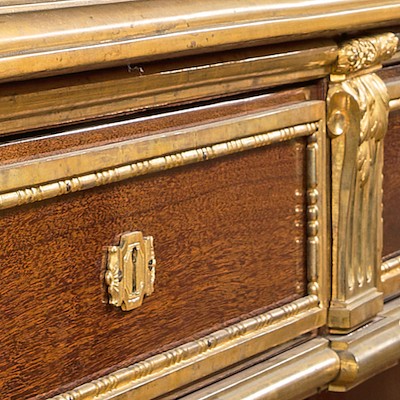MÉRIMÉE (Prosper).
Lot 9
Categories
Estimate:
EUR€300 - EUR€400
$326.09 - $434.78
Absentee vs Live bid
Two ways to bid:
- Leave a max absentee bid and the platform will bid on your behalf up to your maximum bid during the live auction.
- Bid live during the auction and your bids will be submitted real-time to the auctioneer.
Bid Increments
| Price | Bid Increment |
|---|---|
| No bidding increment | |
About Auction
Catalog Only
By Beaussant Lefèvre & Associés
Dec 13, 2022
Set Reminder
2022-12-13 08:00:00
2022-12-13 08:00:00
America/New_York
Bidsquare
Bidsquare : Furniture and Works of Art from the Anne Aymone and Valery Giscard d’Estaing Collections
https://www.bidsquare.com/auctions/beaussant-lef-vre-associ-s/furniture-and-works-of-art-from-the-anne-aymone-and-valery-giscard-d-estaing-collections-11505
Beaussant Lefèvre & Associés contact@beaussantlefevre.com
Beaussant Lefèvre & Associés contact@beaussantlefevre.com
- Lot Description
MÉRIMÉE (Prosper). Collection of two works bound in one volume in-8 of tobacco calf, smooth spine decorated with gilt fillets and black scrolls, speckled edges; spine a little rubbed, a few quires with foxing, plates of the 2nd work browned (binding around 1850).
- NOTES D'UN VOYAGE EN AUVERGNE. Paris, H. Fournier's bookshop, 1838. In-8, (4 of which the last one is blank)-414 pp. without the last blank leaf. One lithographed folding plate placed in frontispiece.
Observations recorded during an official tour carried out as inspector general of the Monuments historiques from May to August 1837, and which led him among others to Aurillac, Clermont, Issoire, La Chaise-Dieu, Royat, Saint-Nectaire, Thiers, but also incidentally to Bourges, Conques, Figeac, Le Puy-en-Velay, Limoges, Rodez, Saint-Étienne.
- NOTES OF A TRIP IN CORSICA. Paris, Fournier jeune, 1840. In-8, (4 of which the last one is blank)-236 pp. 11 lithographed plates out of text.
Observations recorded in the same frame during the tour he made from August to October 1839 on the island of beauty. Unlike the other volumes of Notes de voyages that he published, he is also interested here in the customs of the inhabitants, notes popular superstitions, songs in Corsican language that he delivers in appendix with French translations, among which lamentations on the death of people victims of vendetta. This trip, reinforcing Prosper Mérimée's interest in Corsica (to which he had already dedicated the short story Matteo Falcone), provided him with many elements for the writing of Colomba, published in the Revue des deux mondes in 1840 and then in bookshops the following year.
BIRTH OF THE NOTION OF HISTORICAL HERITAGE. It is under the Convention that a real reflection was started on this notion understood as common good. This led in 1795 to the creation by Alexandre Lenoir of the Museum of French Monuments and in 1819 to the establishment of a budget line to carry out archaeological excavations and to help in the conservation of degraded monuments. At the same time, different authors favored the development of a taste for the vestiges of the past, especially those of the Middle Ages: François-René de Chateaubriand with Le Génie du christianisme (1802), Alexandre de Laborde with Les Monuments de la France (1816-1836), Baron Taylor and Charles Nodier with Les Voyages pittoresques dans l'ancienne France (1820-1878), or Victor Hugo with his preface to Notre-Dame de Paris (1831). Finally, the Minister of the Interior François Guizot created the position of Inspector General of Historic Monuments in 1830, initially entrusted to the historian Ludovic Vitet, with the mission of taking care of the inventory, restoration and safeguarding of monuments. Shortly thereafter, in 1837, Louis-Philippe I decided to transform the Palace of Versailles into a museum dedicated to the history of France.
PROSPER MÉRIMÉE GENERAL INSPECTOR OF HISTORICAL MONUMENTS. He was appointed in 1834, after the withdrawal of
He was appointed in 1834, after the withdrawal of Ludovic Vitet, and exercised these functions until 1852, relying on the Commission des Monuments historiques created in 1837. Prosper Mérimée travelled all over France and sent many reports to the ministers and to the Commission: he denounced vandalism, that of the revolutionaries, but also that of his contemporaries, whose stupidity or ignorance often endangered historical monuments, either through contempt for the past, or through a misguided interest in inappropriate repairs or reconstructions.
LES NOTES DE VOYAGE, PIÈCES D'HISTOIRE ET DE LITTÉRATURE AU STyLE VIF ET ACÉRÉ, fill a total of four collections, which, in addition to those devoted here to the Auvergne and Corsica, concern the Midi (1835), and the West (1836). In the absence of systematic iconography, Prosper Mérimée adopts a descriptive method based on meticulousness and scientific caution. "Their main merit, in addition to informing us about the state of the heritage in the years 1830-1850 and the immense efforts made to save it, is probably to reveal to us a man of action, a discoverer truly passionate about his duties, wishing to share his passion for the works of the past, a traveler who is finally very modern" (Colette Becker).
Provenance: library of the geologist Victor Thiollière, 1801-1859 (ex-libris stamps on the titles).



 EUR
EUR CAD
CAD AUD
AUD GBP
GBP MXN
MXN HKD
HKD CNY
CNY MYR
MYR SEK
SEK SGD
SGD CHF
CHF THB
THB









